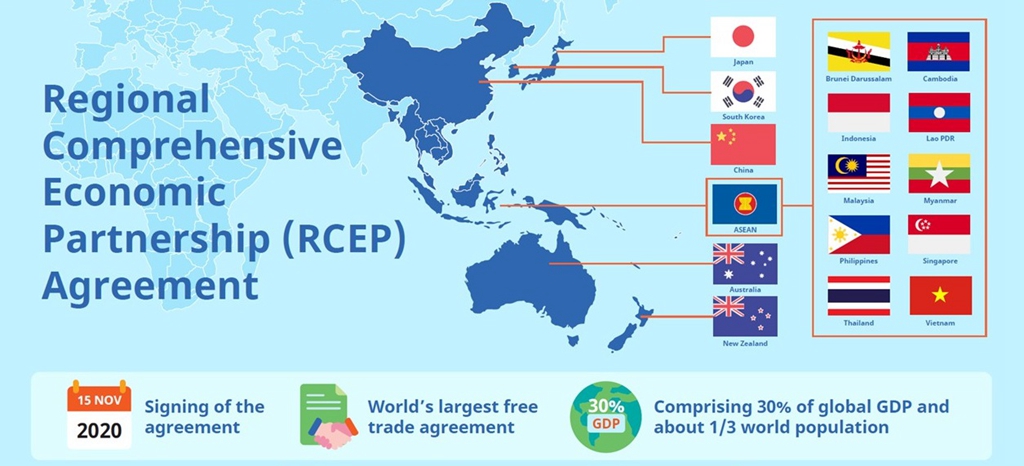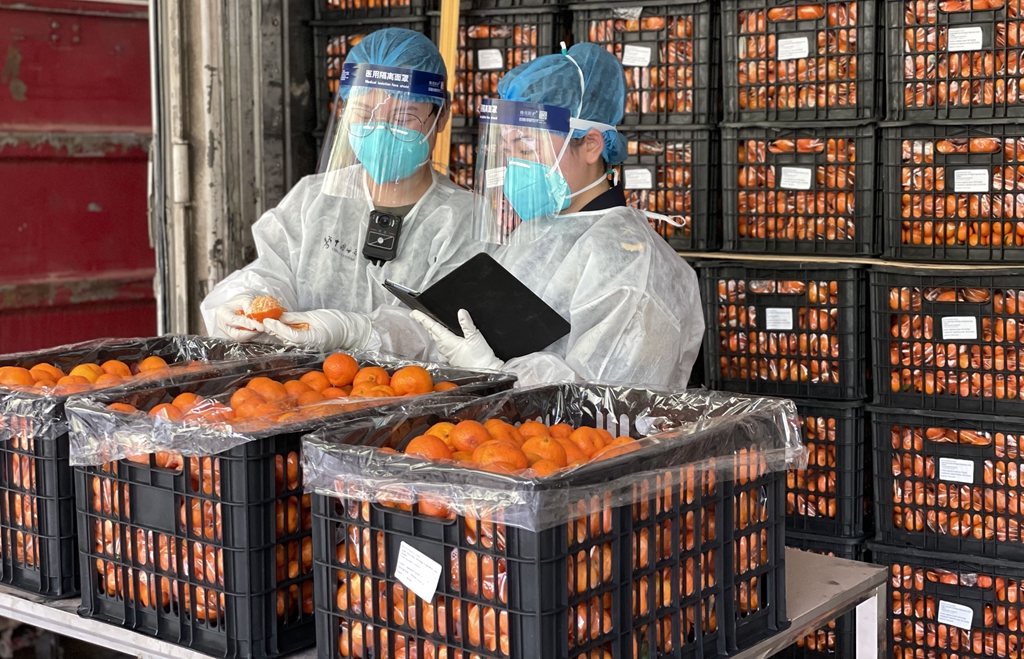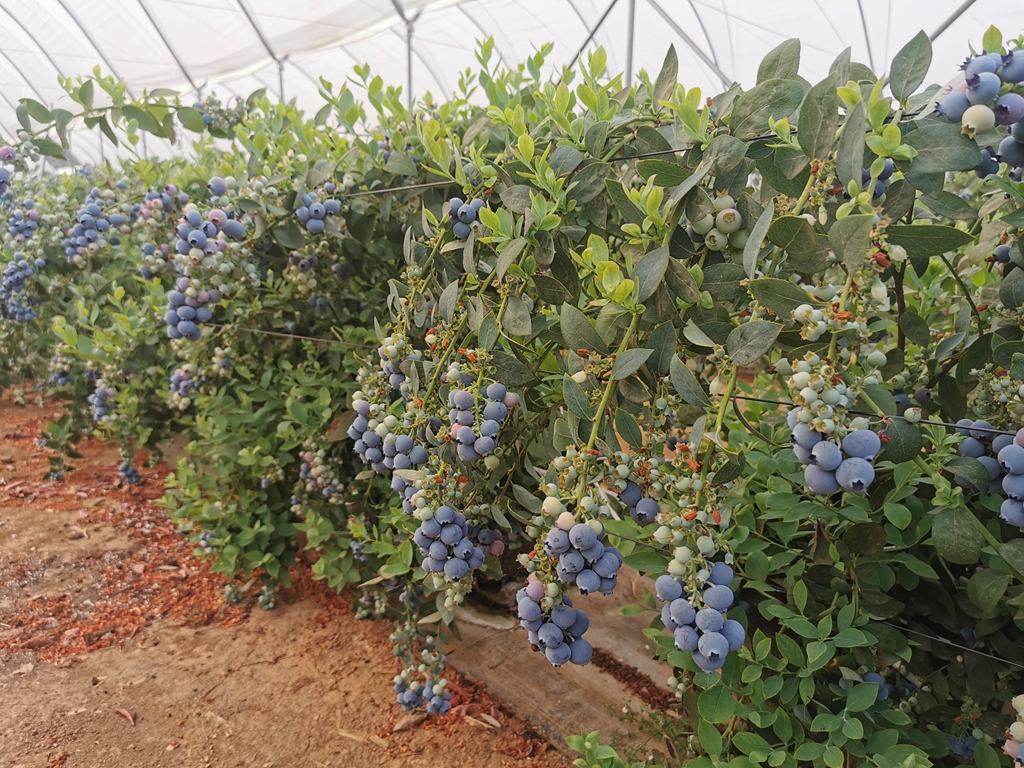Eric's Insight: RCEP, booster of Yunnan trading ties with ASEAN
Yunnan topped Chinese provinces in export volume of fruit and nuts in 2021, with the major destinations being Thailand, Vietnam, Malaysia, Myanmar and Indonesia. As ideas of the RCEP get trendier day by day, Yunnan province will see even closer trading ties with the ASEAN nations.

An RCEP diagram (Online photo subject to deletion)
RCEP makes buzzword at Two Sessions
“The Regional Comprehensive Economic Partnership (RCEP) has created the largest free trade zone in the world. We will encourage enterprises to make good use of preferential tariff treatment, cumulation of origin, and other rules under the RCEP framework to expand cooperation on trade and investment.”
Chinese premier Li Keqiang said this in a government work report that was delivered at the Fifth Session of the 13th Chinese National People’s Congress (NPC) on March 5, part of the annual Two Sessions (the other being CPPCC).
Two days later, Chinese State Councilor and Foreign Minister Wang Yi said China and ASEAN must be pacesetters in regional cooperation when it came to RCEP. “We will move toward comprehensive and effective implementation of RCEP and launch a new round of upgrade of the China-ASEAN Free Trade Area as soon as possible.”

Customs officers in south Yunnan inspect fresh oranges to be exported to ASEAN countries. (Photo/Yunnan Daily)
As a lush Chinese province that borders three ASEAN nations and lies nor far from the Indian and Pacific oceans, Yunnan needs to expand cooperation with the neighboring countries in blue, green and digital economies, seizing business opportunities from the New International Land-Sea Trade Corridor, which is expected to further link up west China, ASEAN and South Asia.
“Yunnan should give full play to its location advantages, seize the business opportunities brought by the China-Laos railway and the launch of RCEP, and take measures to create an international business environment that is market-oriented and rule-based,” said Zhang Hui, an NPC member from Yunnan province.
Yang Xiaohong, a Yunnan-based member of the CPPCC National Committee, believed the China-Laos railway and the RCEP’s coming into effect mean that China has further integrated into the Southeast Asian regional economy. This poses both an opportunity and a challenge for national agriculture.
For fruit farmers in Yunnan province, they see the China-Laos railway and the RCEP as mutually beneficial. Tropical fruits from ASEAN are enriching the dinner tables of Yunnan consumers, while Yunnan fruits of apples, oranges and grapes are gaining popularity in ASEAN countries.

Blue berries grow well in a green house in central Yunnan's Mile city. (Photo/Yunnan Daily)
RCEP boosts Yunnan trade with ASEAN
Since the RCEP’s effect at the 2022 onset, Mohan check point near the China-Laos border has seen 33,000 tons of Yunnan fruits exported to ASEAN with a value of 354 million yuan as of March 14, up by 9.1% and 23.3% year on year.
With the China-Laos rail and the Kunming-Bangkok road passing through, the Mohan border gate in south Yunnan’s Xishuangbanna is now much busier. Last year, 150,000 tons of Yunnan fruits were exported via Mohan to Thailand with a sum of 2 billion yuan.
Hongxing Donghong, an international trade company based in Xishuangbanna, has benefited 300,000 yuan from the RCEP rules, licensing 46 export certificates of origin that involved a gross value of 12 million yuan.
"With the certificate of origin, we’re selling fresh fruits to Thailand with zero tariff, and the certificate available online reduces cost in running a business," said He Zhaoshi, declaring manager of the company.
Upon the RCEP taking effect, local customs officers said, special training sessions were held to interpret the RCEP policies on tariff reduction. "We offered one-to-one policy guidance to businesses within our jurisdiction," said Shen Xueliang, head of the international business section of Mengla Customs.

Customs officers check growth of blue berries in a green house, south Yunnan's Mengzi city. (Photo/Yunnan Daily)
Wang Hailing, deputy director of RCEP Research Center of Yunnan International Trade Association, pointed out that Yunnan needs to roll out targeted policies on fruit export to different countries, tapping the market potential in RCEP member countries.
Data in 2020 showed Vietnam topped destinations for export of Yunnan fruits. Wang said Vietnam will cut taxes of 87 Chinese products in total, covering most of Yunnan fruits. In 2022, tariffs of 46 products will be reduced from 24.08% to zero.
Under the RCEP mechanism, Yunnan can take Malaysia, Philippines, Indonesia and Thailand as prospect markets for Yunnan fruits. More grapes, pears and apples are expected to be exported to Malaysia, while Yunnan grapes and oranges are mostly aimed at the Philippine market.
"Since RCEP came into effect, businesses in member countries have been optimistic about regional trade and investment, seizing new opportunities." Xu Ningning, chairman of the RCEP Industry Cooperation Committee, said at an online forum on March 25.
With the RCEP agreement effective in 12 of its members now, Xu noted, the free-trade mechanism holds a biggest potential for regional economic growth. Yunnan’s trading ties with ASEAN look promising.
(The writer Eric Wang Shixue is an English editor with the Mekong Magazine based in Kunming, Yunnan province. The view in the article does not necessarily represent that of Yunnan Gateway.)